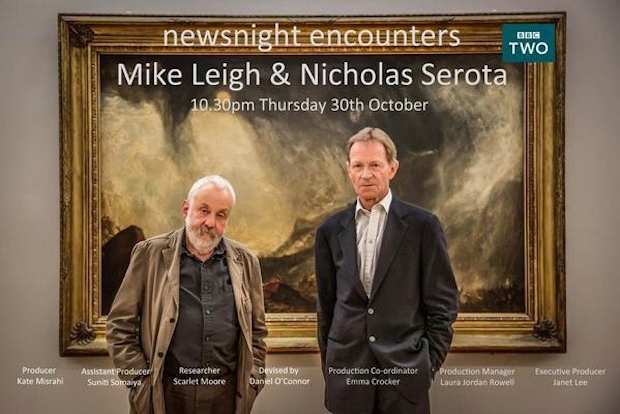Newsnight‘s decision to interview misogynist comedian Daniel ‘Dapper Laughs’ O’Reilly has been slammed as a cynical ratings grab, a descent even from the depths plumbed by devoting 15 minutes to Russell Brand’s latest booky-wook. The criticism is misplaced, however. In both interviews, the respective hosts, Emily Maitlis and Evan Davis, dissected their subjects’ work and challenged their arguments. It’s in Newsnight‘s coverage of high culture, not popular culture, where the rot has set in, with a proliferation of glossy advertorials that have no journalistic purpose.
In the past six weeks, Newsnight has presented us with the following: an interview with Howard Hodgkin to coincide with his exhibition at the Alan Cristea Gallery, Mayfair; an interview with Michael Caine ahead of the release of his new movie Interstellar; curator Neil MacGregor giving us a ‘virtual tour’ of the British Museum’s Germany exhibition; film director Mike Leigh, who has a film out on Turner, in conversation with Nicholas Serota of the Tate galleries, which is also exhibiting Turner; and there were the six back-to-back interviews with the shortlisted authors of the Booker Prize.
The purpose of each of these was promotional. While it is expected that arts public relations and arts journalism will interact, you would think that a programme such as Newsnight would probe and push back just a little. It hasn’t been. The Alan Cristea Gallery must have been delighted to hear Stephen Smith, Newsnight’s arts correspondent, gush that Hodgkin is ‘enjoying the best reviews of his career’ and under-going ‘an Indian summer of productivity’. The interview that followed was genuflecting. The questions included: ‘Your painting appears effortless, the paint just seems to glide or splash off the wood’; ‘you spend a lot of time staring at the wall, but our viewers should not get the impression that you stare at them without inspiration, am I right?’; and ‘if art works, other people identify with it, we’re all on the same journey, I suppose’. Grammatically, many of these were not even questions at all.
The Hodgkin interview, however, was a devastating inquisition compared to the Mike Leigh/Nicholas Serota puff piece on Turner, in which there was no journalistic presence whatsoever. It was just the two of them praising each other’s efforts, which they have an obvious interest in doing given that each will want to piggy-back on the ticket sales of the other. What followed was a lifeless 10-minute dialogue, stiffly engineered to set up pre-selected clips show-casing the film. Among the more animated exchanges were:
ML: Was there any criticism you would make of the film, any adverse criticism?
NS: No.
The temperature did admittedly rise towards the end with this ferocious confrontation:
NS: If I had a quibble, it’s that we didn’t see him paint with a palette knife.
ML: That’s a good quibble. I accept that.
The sight of two luvvies licking each other’s balls is set to become a familiar one on Newsnight. The BBC website breathlessly informs us that this is the first of a ‘series of encounters between cultural figures’ that the programme is going to arrange. They are calling it ‘Newsnight Encounters‘. The slot will even have its own signature music of ambient jazz, perhaps to warn the viewer that what they are about to see is empty, self-congratulatory toss.
What’s most irritating about all this, however, is that the subjects on whom Newsnight has been lavishing its patronage do not, in the main, need it. Howard Hodgkin, Michel Caine, Mike Leigh, Germany – these are not breakthrough acts (you can see from the O’Reilly interview that Newsnight treats those quite differently – longer clip here). The British Museum and Tate Modern must have snaffled up enough taxpayers’ money over the years not to be in need of an indirect bung from the licence fee payer as well. Ian Katz, Newsnight’s newish editor, was supposed to be ushering an edgier, more eclectic era for the programme. Instead he presents us with the same big establishment hippos splashing around in the same publicly-funded pool.
I am aware that BBC arts coverage is a bit jinxy. The ill-fated Late Review was a ratings Bermuda Triangle. The Culture Show survives but is unsettled. The BBC, of course has to cover the arts, because it is a public service broadcaster and they are integral to the public sphere. But for that coverage to be worth anything it should critically engage with the artist’s output, otherwise it’s just advertising, which I always thought the BBC was not supposed to do.






Comments